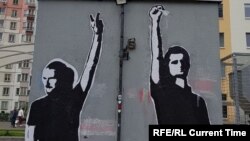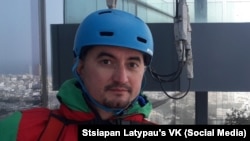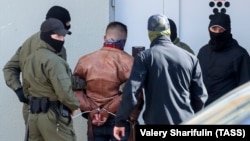As courtyard disputes go, the battle for control of a small stretch of wall on a children's playground in Minsk is a regime-changer.
Just a short drive north of Mink's city center -- the usual gathering site for mass protests that have been held nightly in the capital since Belarus's disputed August 9 presidential election -- an apartment block courtyard has become a symbol of the resistance to President Alyaksandr Lukashenka's continued rule.
So much so that the courtyard of Building No. 3 has been renamed "Change Square" by locals who have stepped in to protect and maintain a mural dedicated to the opposition.
The mural honors two disc jockeys -- Kiryl Halanav and Uladzislau Sakalouski -- who were punished for spinning a popular Soviet-era protest song during a pro-government rally on August 7.
The two were arrested and got 10 days in jail for their role in hijacking the event by playing the Viktor Tsoi song We Want Changes, but the image of them holding up opposition victory signs as the authorities moved in was soon preserved in black and white spray paint.
Ever since, the wall alongside a merry-go-round and a children's playhouse has become a battleground, with masked men under police guard coming to paint over the mural, and the locals quickly repainting it.
"We are restoring what some unidentified persons, vandals, came and painted over," one local resident told Current Time, the Russian-language network led by RFE/RL in cooperation with VOA. "This is our yard, our rules. But some people constantly come and destroy what we create."
The back and forth between residents and the authorities has placed the expansive courtyard in the spotlight. Belarusian musicians have shown up to entertain large nighttime crowds from a first-floor balcony, with the makeshift stage and the rest of the high-rise building lit up in red and white, the colors of the opposition.
'A Symbol Of Change'
Each time the police come to paint over the mural -- at one point handing out a $2,500 fine to the homeowners' association -- local residents emerge with fresh paint and red and white ribbons and flags to redecorate the space.
"For us, this is already a symbol of our yard, a symbol of change and our struggle," another resident of Building No. 3 told Current Time. "We just want to show that we want change and will not just give up."
Stsyapan Latipav rose above the crowd in defending the mural just days after speaking to Current Time.
"One morning we had this mural, and we really like it, we find artistic value in it, especially in the spirit of the time," Latipav said earlier this week. "It reminds us of the achievements of those who do not agree with the current system."
When security forces returned to the courtyard on September 15, Latipav stood his ground, refusing to move as a worker ringed by masked officers again painted over the mural. For this he was subsequently detained, his apartment searched, and he was charged with participating in a riot.
As Latipav was escorted by police from his building, the suddenly noticeably limping resident was met with a chorus of cheers by onlookers. The next evening, Minsk residents gave him the hero's treatment, with "We Are All Stsyapan Latipav" projected on a high-rise in the south of the capital.
At Change Square, nothing really changed. Despite the additional scrutiny by security forces, residents had managed to decorate the playground fence with red and white ribbons.
But on September 16 they awoke to find that the battle of the courtyard continued -- the fence was now green and red, the color of the official state flag and the symbol of Lukashenka's rule.






